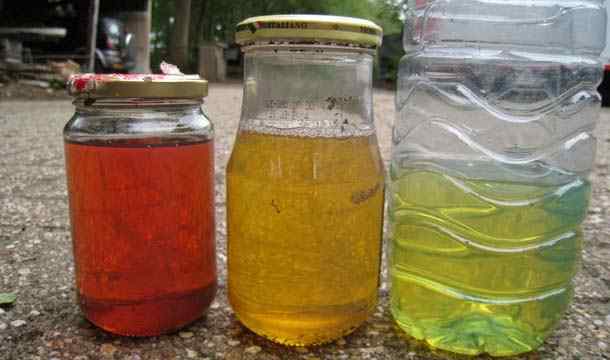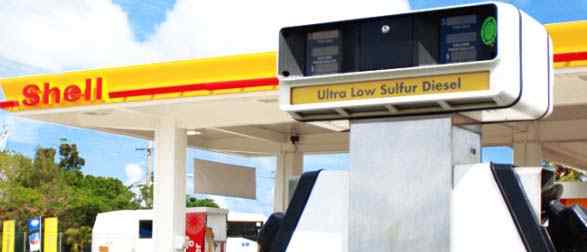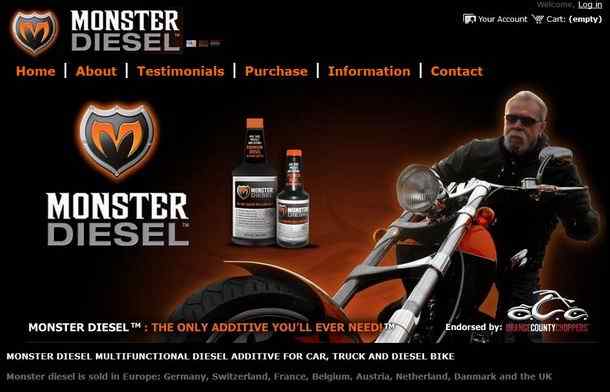 |
Getting more mileage from automotive fuels has never been more in the spot light as it is now. Fuel prices are soaring and most likely continue the upward trend. Here’s a bit about a diesel fuel additives and backgrounds, claiming to improve fuel economy. It’s tested with the V6 diesel engine in our Mercedes Benz 1719A truck.
Diesel fuel degradation
First a bit about what can affect the energy content of diesel fuel - later on the test.
It’s a fact that diesel fuel can degrade over time – the cetane number (CN) can drop significantly when diesel is stored for a long time.
Cetane is a benchmark number for diesel combustion quality - meaning a higher cetane diesel ignites quicker. Diesel engines operate best on 40 to 55 Cetane. Normal road diesel has a cetane level of about 51. Premium diesels can have higher cetane numbers.
 |
| Diesel fuels in Europe |
Diesel fuel can be affected by bacterial growth and sinking of the heavier molecules to the bottom of the tank lowering the cetane level. Condensation in large fuel tanks is a normal phenomena and is the main cause of bacterial growth on the separation line between water and diesel. In the ship / marine industry it’s common to treat diesel fuels with an additive when stored in bulk fuel tanks for a long time.
Degraded diesel fuel can cause flame-outs in parking heaters made by Eberspächer or Webasto. Fuel economy can also be considerable lower than expected due to a decreased cetane level.
Modern fuel - Ultra low sulfur diesel
In recent years the EN590 specification (Europe) - describing the physical properties of automotive diesel fuel - also changed. The EN590 specification is more strict limiting the sulphur content to a maximum of 15 ppm - known as Ultra-low-sulfur diesel (ULSD).
 |
| Ultra low sulfur diesel - modern fuels |
Reducing sulphur content decreases the natural lubrication properties of diesel fuel. Refineries now compensate lubrication loss with their own additives. Also low sulphur diesel is more prone to bacterial growth, because the anti-septic effect of sulphur is practically gone.
There are claims that Ultra low sulfur diesel affects fuel economy – the energy content of ULSD is slightly less (approx. 1%) compared to older high sulphur diesel fuels.
Not surprisingly the production cost of Ultra low sulfur diesel is higher compared to older diesel fuels.
Diesel fuel additive
The question is, would adding your own diesel fuel additive increase fuel economy?
We took it to the test, with 4 bottles of Monster Diesel enough to treat 948 liter diesel for our Mercedes Benz 1719AK truck;
 |
| Fuel additive - Monster Diesel website - www.monsterdiesel.eu |
In this practical road test monster Diesel is used with normal low sulfur (50 ppm) diesel.
Assuming a claimed fuel economy of -15 %, Monster Diesel should save up-to a maximum of 142 liters of fuel on the same distance. With an average European price of € 1.50 / liter that’s € 213 minus € 18,- per bottle Monsterdiesel should save less than € 141,-
In short: We didn’t notice any significant difference - the truck's fuel economy didn’t change over a distance of approximately 3000 Km.
The OM401 9.6 Liter V6 diesel engine – completely overhauled in 1998 – kept it’s almost rock steady “tarmac” fuel consumption of 30.2 liters / 100 Km. The 15 % better fuel economy should have resulted in a drop to 26 liters / 100 Km – which it didn’t.
Although this test is uncontrolled, we know our truck and engine pretty well. Even a slight improvement in fuel economy would have caught our attention specially when driving long distance highways.
Nonetheless, Monster Diesel might show an improvement when used with degraded diesel fuel affected by bacterial growth or a low cetane level. On modern European low sulfur fuels within EN590 specification the effect can be expected to be far less.
Related articles for diesel fuel additives
Eberpächer diesel fuel parking heater
Mercedes Benz 1719AK expedition truck



